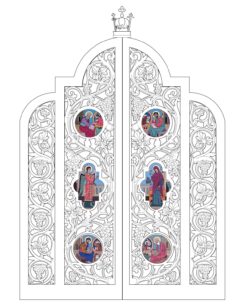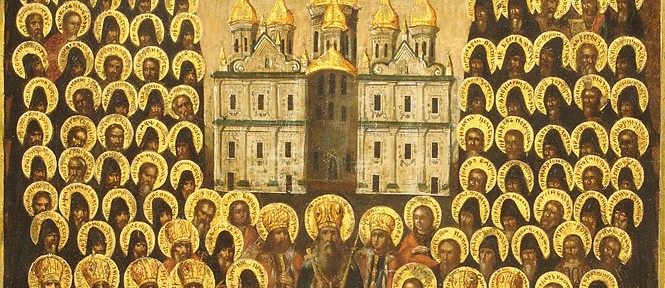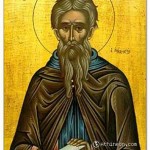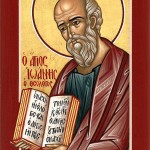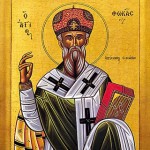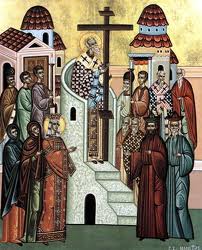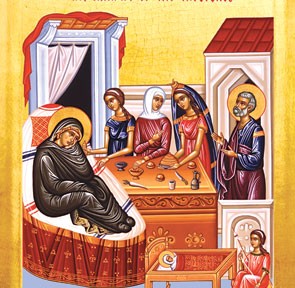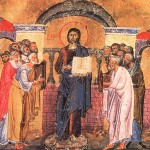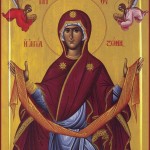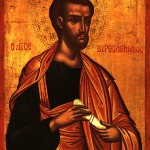GREAT VESPERS
At Psalm 140
In Tone 3
10. By Your Cross, O Christ our Saviour,
the power of Death has been vanquished
and the deceit of the devil has been destroyed.
Therefore, mankind, saved by faith,
offers You hymns of praise forever.
9. O Lord, all creation has been enlightened by Your resurrection,
and Paradise has been reopened;
therefore, all creation extols You
and offers You hymns of praise forever.
8. I glorify the powers of the Father, Son, and Holy Spirit;
and I praise the dominion of the undivided Divinity,
the consubstantial Trinity,
Who reigns forever and ever.
7. We adore Your precious Cross, O Christ,
and with hymns of praise we glorify Your Resurrection;
for by Your wounds we have all been healed.
6. Let us sing the praises of the Saviour,
Who was incarnate of the Virgin;
for He was crucified for our sake,
and on the third day He arose from the dead,
granting us His great mercy.
5. Christ descended into Hades and announced to those confined there:
Take courage, for today I have conquered death.
I am the Resurrection, the One Who will set you free.
I shattered the gates of the realm of death.
4. O Christ our God, we unworthily stand in Your most pure temple,
and offer to You our evening hymns.
From the depths of our souls we cry out to You:
O Lover of Mankind, Who has enlightened the world
by Your Resurrection on the third day,
deliver Your people from the hands of Your enemies.
In Tone 1
3. O St. Olga, morning star of Christ’s gospel proclaimed in the city of Kyiv,
and St. Volodymyr, equal-to-the-Apostles, Baptizer of Rus’-Ukraine,
and all holy princes, God-pleasing leaders of our nation!
By your holy lives you opened the doors of truth and grace.
You strengthened the Church of Christ in our Ukrainian lands.
You are our constant protectors and intercessors, our honour and glory.
Therefore, may your names shine forth forever,
and may they be for us an inspiration to faithfulness
and perseverance in the holy faith,
for the salvation of our souls.
2. All the choirs of the hierarchs, mighty luminaries of the Ukrainian Church!
As faithful followers of the apostles and as good shepherds,
you faithfully preserved the flock entrusted to you;
you led it along paths of truth and carefully fed it with spiritual food,
not hesitating to give up your lives for your sheep.
Therefore, together with St. Josaphat, the priest-martyr,
implore the Chief Shepherd, Christ God,
for Ukrainian nation’s faithfulness to His commandments
and great mercy for our souls.
1. Venerable fathers of the Monastery of the Caves, Anthony and Theodosius,
the first flowers of the Ukrainian Church,
and all the countless righteous ones who followed after their steps,
dedicating their lives to God!
You shine forth as an example of Christian perfection,
and you teach us by prayer and self-denial
to configure ourselves to Christ God for the salvation of our souls.
Therefore, implore the good God, that we may be made worthy of your intercession,
and that together with you, through prayer and sacrifice,
we may obtain for Christ’s Church and our Ukrainian nation
mercy and God’s bountiful blessings.
Glory…
O Martyrs and confessors, hierarchs and priests, religious and laity,
who, for the sake of Christ, suffered in prisons and labour camps,
and were broken in spirit and wasted by beatings, starvation, and cold!
Your numbers and your names are known only to the all-knowing God.
You shed rivers of righteous blood;
and with your tears bedewed the prison cells and torture chambers.
Your martyrs’ blood testifies before heaven and earth to your unwavering faith in God.
You are our powerful intercessors before the throne of the Most High.
Therefore, with the Mother of God, implore the heavenly Father,
the Saviour Jesus Christ, and the Holy Spirit, the Comforter,
a continuous blessing upon our Church and nation,
so that they could joyfully and freely glorify your holy names.
In Tone 3, Now…
O Lady most honourable,
how can we but be rapt in wonder
at you giving birth to the Incarnate God
who, without a mother, was born of the Father before all ages?
You gave Him birth in the flesh without a father,
without a man instrumentality.
He is God and man whose two natures are intact,
neither one losing any of its properties.
Therefore, O Virgin Mother,
intercede with Him to save the souls
of those who believe and confess in true faith
that you are the Mother of God.
Readings
(1) Sirach 34:13-17; (2) Wisdom 3:1-9; (3) Sirach 1:11-21
Lytia
In Tone 2
Let us extol today the illustrious and sacred memory
of our first God-inspired rulers and clergy,
who delivered us from the darkness of idolatry
and brought us to the Sun of Justice, Christ our God.
May the supplications of the ancient righteous ones of the land of Ukraine
and the sufferings of our confessors of the holy Gospel
rise as fragrant incense before the throne of the Most High;
for it is better by the sacrifices that the Church of Christ in Ukraine
is regenerated and strengthened.
In Tone 5, Glory…
Let a mighty ‘Hosanna’ resound throughout heaven today
and the golden fields of our wide steppes
from the prayerful hearts of the millions of our faithful
who glorify and thank You, O gracious and almighty God,
for the most precious gift, the Christian faith and the tablets of Christian holiness,
which our ancestors received from Your great goodness
and passed on to us for the sanctification and salvation of our souls.
Now…
You are the temple, the gate, the palace, and royal throne, O most pure Virgin.
Through you my Saviour, Christ the Lord,
appeared as the Sun of Justice to those who were sleeping in darkness,
desiring to enlighten those He had created in His own image.
Therefore, O all-gracious One, with a mother’s confidence,
pray to Him unceasingly that our souls may be saved.
Aposticha
In Tone 3
O Christ, Who darkened the sun by Your passion
and enlightened all creation by Your resurrection,
accept our evening prayer; for You love mankind.
The Lord reigns, He is clothed in majesty. Robed is the Lord, and girt about with strength.
O Lord, Your life-giving Resurrection has enlightened the entire universe
and has revived Your creation which lay in corruption.
Therefore, we, who have been released from the curse of Adam, cry out to You:
Almighty Lord, glory to You!
For He has made the world firm, which shall not be moved.
O God, although in Your divine nature You are unchangeable,
yet in Your human nature You underwent change by suffering in the flesh.
All creation was prostrate with fear
when it saw You hanging on the Cross,
and it groaned in sorrow as it sang the praises of Your long-suffering.
But You descended into Hades and arose on the third day,
granting life and great mercy to the world.
Holiness befits Your house, O Lord, for length of days.
You suffered death, O Christ, to deliver mankind from death.
And when You arose from the dead on the third day,
You enlightened the world
and resurrected all who acknowledge You as God.
In Tone 4, Glory…
We glorify the Father, and the Son, and the Holy Spirit,
and render thanks to You, the Triune God of one essence,
for the precious treasure which You deigned to give
to our holy princes and teachers,
holy priests and monks, confessors and martyrs for the Church of Christ.
Their struggles are the source of our strength.
Therefore, by honouring their memory we, together with them,
beseechingly cry out:
Lord, grant that we may all be one,
that all the children of Rus’-Ukraine may extol You
with one heart and one voice, the only true God,
and become worthy of Your eternal bliss
in the light that knows no evening.
Now…
O most pure Virgin, hear the petitions of your servants.
Remove the burdens which oppress us,
and deliver us from our sorrows;
for you are the only firm and constant support on whom we rely.
O Mother of God, never permit us who call upon you
to be overwhelmed by our cares.
Hasten to fulfill the supplications of all who, in faith, cry out to you:
Rejoice, O Lady, helper of all mankind,
the joy, the refuge, and the salvation of our souls.
Troparia
In Tone 1
Rejoice, Virgin Mary, Mother of God, full of grace,* The Lord is with you.* Blessed are you among women, and blessed is the fruit of your womb.* For you have borne Christ,* the Saviour and Deliverer of our souls. (2)
In Tone 4
O Princes and bishops glorified in Christ,* you monastics and martyrs,* and you staunch confessors from every age of Christian Ukraine,* pray to Christ our God that He gaze with a merciful eye on our nation* and grant it the grace to endure in faith,* and that the souls of its devout faithful, who honour your sacred memory,** may be saved.
DIVINE LITURGY
Troparia and Kontakia
Troparion, Tone 3: Let the heavens be glad, let the earth rejoice,* for the Lord has done a mighty deed with His arm.* He trampled death by death. He became the first-born of the dead;* He saved us from the abyss of Hades* and granted great mercy to the world.
Troparion, Tone 4: O you, who glorified Christ:* princes and bishops,* monastics and martyrs,* and steadfast confessors of Christian Ukraine throughout all times,*pray Christ God to look with favour on our people* and to grant them the grace to persevere in the faith* that the souls of prayerful faithful* who revere your sacred memory* may be saved.
Glory be to the Father and to the Son and to the Holy Spirit.
Kontakion, Tone 3: You rose from the tomb, O compassionate Lord,* and led us out from the gates of death.* Today Adam exults and Eve rejoices,* and the prophets together with the patriarchs* unceasingly acclaim the divine might of Your power.
Now and for ever and ever. Amen.
Kontakion, Tone 4: You shine as bright beacons,* O God-inspired and righteous saints of our Church.* By your encouraging example,* you serve communities of faithful throughout the Christian world.* Therefore we humbly bow our heads to you* thanking our great and all-gracious God* Who has made you our intercessors in heaven* where you pray for our souls.
Prokeimenon, Tone 3
Sing to our God, sing; sing to our King, sing.
verse: Clap your hands, all you nations; shout unto God with the voice of joy. (Psalm 46:7,2)
Prokeimenon, Tone 7
Precious in the sight of the Lord is the death of His venerable ones.
Epistle
Romans 6:18-23; 8:28-39
Alleluia, Tone 3
verse: In You, O Lord, have I hoped that I may not be put to shame for ever.
verse: Be a protector unto me, O God, and a house of refuge to save me. (Psalm 30:2,3)
verse: Blessed is the man who fears the Lord; he shall delight exceedingly
Gospel
Matthew 8:5-13; 5:1-16
Communion Hymn
Praise the Lord from the heavens;* praise Him in the highest. (Psalm 148:1)* Rejoice in the Lord, O you just;* praise befits the righteous.* Alleluia, alleluia,* alleluia. (Psalm 32:1)
